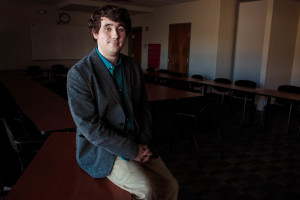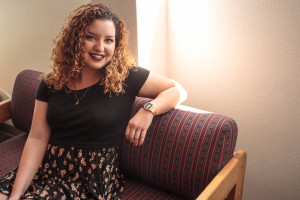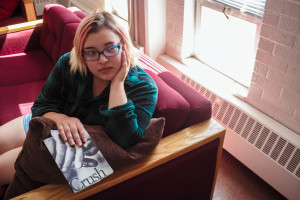Tags
Related Posts
Share This
Senior Readings Round 3
For graduating seniors Franco Romero, Victoria Dailey and Marina Woollven, the process of creating their senior collections hasn’t been easy, but their final books are lasting artistic accounts that are distinctly their own. They will read from their work in the third Senior Reading event, “Fates of Venus,” April 19.

Senior Franco Romero. Photo by Marco Rivera
“It’s been kind of a weird journey for my book,” says Romero, “because it’s stuff I’ve written throughout my four years here but I spent like all last summer thinking about it and trying to come up with a cool concept.” Romero goes on to say that his book was all short fiction originally and that he had been bouncing graphic design ideas off of his friend and graphic designer, Caleb Ortega, for a few years. When he got into the Senior Reading class however, things changed.
“Matt Donovan was really surprised I didn’t have any of my poetry in it and Julia Goldberg was really surprised I didn’t have any of my nonfiction in it,” Romero says, “and they said that it didn’t make much sense that I’ve spent so much time in these classes and that this work isn’t in my book. So, I ended up going back and it has completely changed. It’s not even the same book now.”
As the process of recreating the book wore on, new themes arose in the collection. “I think you can look at my whole collection as a spiritual journey of sorts,” Romero says. “I feel like I’m constantly writing about loss of innocence and my concept of the human soul. Something I’ve also noticed, only recently because people have pointed it out, is the minutia of our world. Like, how the smallest parts of nature and the animal kingdom relate to us as humans.”
One of the largest challenges as he constructed the collection stemmed from the gap he could identify in skills and the shifting emotional landscape from an earlier self.
“This collection is not necessarily me now,” says Romero, “it’s sort of all of the stuff that I’ve been wrestling with the entire time I’ve been here, so you can see shades and threads of things that happened in my personal life. So, having to go back and look at that stuff again and then talk about these things again when I feel like I’ve already moved beyond that was really difficult because I wanted to bring my style and my voice that I have now and bring it into that work, but that’s not necessarily right for that work anymore.”

Senior Victoria Dailey. Photo by Marco Rivera
Dailey corroborated this struggle, collecting her book in a process she described as “tumultuous,” searching through the volume of pieces.
“It was hard going through pieces and trying to adapt them to the writers we are now but also how we view the world now,” she continues, “It was pretty hard trying to find that adaptation of, in the process of revising, trying to find a balance between who I found myself being my freshman and sophomore years here and who I am now.”
The person she finds herself now is one of a striking poetic voice and distinct thematic resonance.
“There’s some really strong female sexuality in my book, and feminine strength and feminine power,” Dailey says. “It’s kind of a mix of trying to understand female intuition and a woman’s perspective through my own lens. There’s a lot of focus not only on that, but on religion and god as well.” Dailey’s book has a kind of accrual of self-worth as well, starting in a place of perceived worthlessness, and moving into a position of power.
A piece that she’s most proud of, mostly because it was such a different type of writing, is a lyric essay with received form of an astrological zodiac website. She poured in her own associations around the Libra sign.
“I ended up writing about what it’s like to be in love with a Libra woman and making it really satirical and kind of ridiculous, which is something I’m not really used to at all,” says Dailey. “I tend to be very serious and very lyric in my writing and exploring this genre allowed me to be able to be a lot more comedic.”
Her book is distinct both in her written voice, and in the corresponding cover art designed by Mariah Romero, which depicts the pubic region of a woman covered with crocheted flowers.
“I was thinking of something a lot more illustrated, and it didn’t really fit,” says Dailey. “So, for her to really dive into my main and strongest themes with this beautiful image was just awesome.”

Senior Marina Woollven. Photo by Marco Rivera
Marina Woollven’s process was similar to Romero’s, as she had a plan in place for the book, and it took a different path.
“It was an interesting process because I had this idea of what I wanted it to be a good year before Senior Reading, but it didn’t work out,” Woollven laughs. “So what I ended up doing was just grabbing material that was mostly finished and was something that was really valuable to me and really resonated with me. This was a mixture of poems and some fiction.”
After collecting these works of fiction and poetry, she found rather serendipitously that the pieces resonated thematically, and that the collection had, in a way, “generated itself.”
“There’s definitely a soft ache to it,” Woollven says, “you know, there’s a lot of stuff about the desire to connect and being unable to for whatever reason, the contrast of being alone and not being alone, there’s a lot of void stuff in there.”
Woollven described her work as occasionally “creepy, Cthulhu, Twilight Zone shit,” as it dips into the surreal or body horror prose. At the same time, she has tinges of romance in her poetry that strikes the theme of the void between people and the desire to connect.
“I feel deeply satisfied that I’ve written the right kind of collection for me,” Woollven says.
Victoria Dailey, Marina Woollven and Franco Romero will read from their collections at 7 p.m. on April 19 in the O’Shaughnessy Performance Space.






 Jackalope Magazine is the student magazine of Santa Fe University of Art and Design. Building on the interdisciplinary nature of our education, we aim to showcase the talent of our university and character of our city.
Jackalope Magazine is the student magazine of Santa Fe University of Art and Design. Building on the interdisciplinary nature of our education, we aim to showcase the talent of our university and character of our city.
Recent Comments